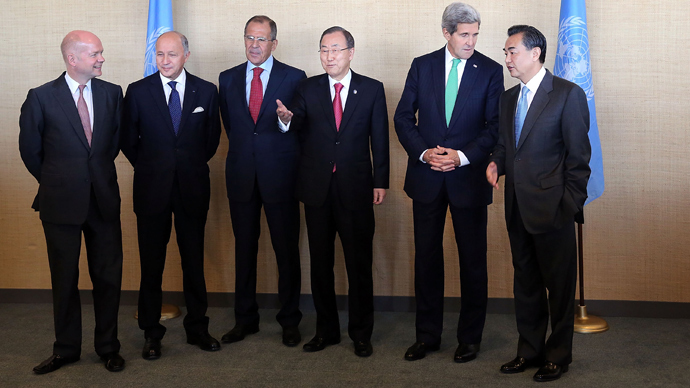'Iran won’t accept nuclear deal US is ready to offer without Israel's approval'

While Iran has accepted all the basic demands of the P5+1 group, Washington remains reluctant to offer anything of equal worth in return without a green light from Israel, Hooshang Amirahmadi presidential contender in Iran’s 2013 race told RT.
The deal currently being discussed in Geneva, if successful,
would only take effect 6 months from the date of signing –
something that the Iranian delegation cannot return to Tehran
with, Amirahmadi added.
RT:With top diplomats, like the US Secretary of State
and the Russian Foreign Minister now unexpectedly gathering in
Geneva - do you think we are on the verge of a breakthrough?
Hooshang Amirahmadi: I think so. The fact is that the Islamic
Republic as we know it at this point has accepted the basic
requirements of the P5+1 and that is that it would make every
effort to show that its nuclear program would remain peaceful,
that it would stop 20 percent enrichment, it would make the
stockpiles irrelevant and so many other steps. So I think at this
point Iran is doing what is was expected to do.
I think the real issue is what Iran gets in return. I think
that’s where the problem really stands now and that is why there
is this trilateral meeting between Ashton, Zarif and Kerry. And I
believe Kerry and Zarif are talking over what to do with the
sanctions. The Americans at this point have not really given up
much.
In fact what they are giving is much less that perhaps than they
were ready to do back in 2003 even. Then they were ready to give
even more than they are now. They are talking about some relief
on frozen assets, not all of them, some of them. They are talking
about some relief on Iran’s petro-chemicals or gold; a lot of
these are completely irrelevant. As far as Iran is concerned. The
real issue with Iran at this point are of course the sanctions on
oil and gas as well as on the banking system.
Even with these sanctions that Mr Kerry is proposing to lift, in
fact even there they are not 100 percent, they are very much not
only half-hearted but that they also want to wait until the end
of this story. That is they are not doing anything until Iran
does what it is supposed to do, and prove that it has done it and
then these sanctions would be lifted. And that means that Iran
would have to wait another six months to get any sanctions
relieved. And that is not the kind of deal that Zarif can take to
Tehran and sell it to anybody in Iran, particularly the radicals.
It would be impossible.
RT:The Israeli Prime Minister criticized the potential
agreement - let's hear what he had to say:
Netanyahu: “Iran got the deal of the century and the
international community got a bad deal. This is a very bad deal.”
RT:Do you think he is jumping into conclusions here in
terms of the deal and what is going to come out of it?
HA: Obviously the Israeli government has insider knowledge
that we don’t. I’m sure that the Israeli government knows exactly
what is happening every second of the way. They are being
informed by US government, briefed every minute. So they have
some idea of what the deal is all about but we know for a fact
that it hasn’t been signed, it hasn’t been completed and that
there is still discussion going on. And Mr Kerry is resisting the
demands from the other five in coming with some kind of better
deal for Iran.

So I think yes, Mr Netanyahu is obviously acting upon certain
information that it has but at the same time jumping to
conclusions. I also have to say that the International community,
Iran and the 5+1 must indeed be concerned, be seriously looking
into the concerns of Israel. I think we should not simply dismiss
Mr Netanyahu and the Israelis as being just too early, too tough
and not willing to compromise or being an obstacle. I think after
all Iran and Israel are two enemies unfortunately.
RT:Given that Israel is one of America's closest
allies how much can it influence Washington's dealings with
Iran?
HA: I believe that if Israel is not happy with the deal,
no matter what Mr Kerry promises in Geneva – it will not go. The
fact, the problem is this, that Mr Kerry is going to have to come
back to Washington DC. He is not going to live in Geneva.
When he comes back to Washington he is going to have to see the
crowd around him, the Israeli lobby crowd, the Congress and
others, American right-wingers and the Republican Party.
All of them are going to give him a real, real hard time. And
after all, I don’t think Mr Obama really needs more headache than
he already has with the Congress and the right wing in this
country.
So I do not think that Kerry will in fact agree with anything
that Mr Netanyahu will not be happy with. I’m sure before John
Kerry says yes, before that he will call Mr Netanyahu and make
sure that he is on board. Because here is the US, this is
Washington, this is Israel and its relations with US, I believe
is strategic and unbreakable, it is tough. And it is not going to
go if Israel is not happy. That is just the fact.
The statements, views and opinions expressed in this column are solely those of the author and do not necessarily represent those of RT.












